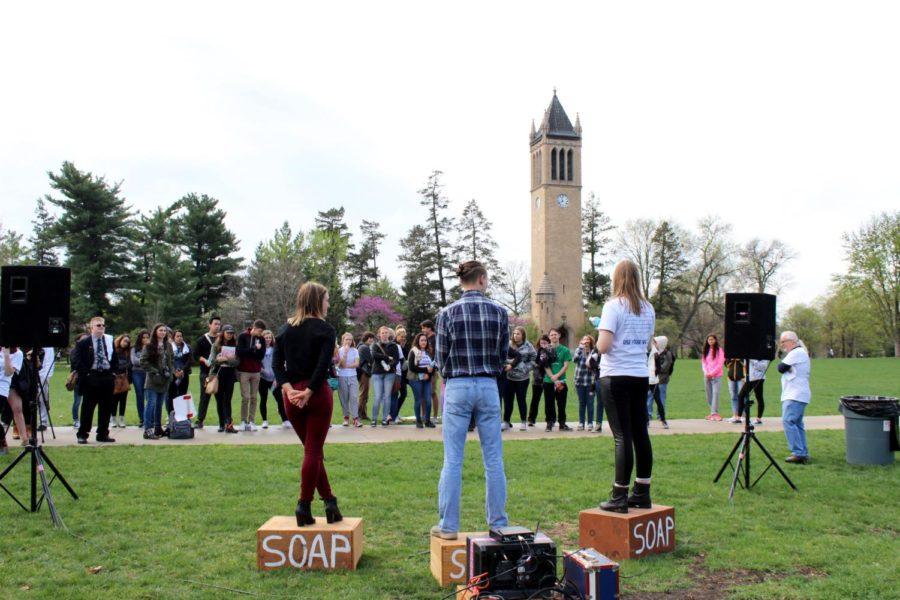Understanding the First Amendment and its role on campus
Speakers who participated in the Voices campaign and Daily editor Sarah Muller address the crowd on First Amendment Day April 21, 2016.
April 19, 2017
First Amendment Day, which will be celebrated at Iowa State on Thursday, is a time to appreciate some of the freedoms that Americans possess every day.
The First Amendment is one of the founding principles of the United States. It provides five essential freedoms: religion, speech, press, assembly and petition. College campuses provide settings where these freedoms, especially freedom of speech, can be exercised.
“[Iowa State University] is a governmental agency, so we have to act within the bounds of both the federal and Iowa Constitution, meaning we aren’t allowed to put in place restrictions that would violate the First Amendment,” said Michael Norton, Iowa State’s legal adviser who oversees the university’s counsel office.
Iowa State’s Facilities and Grounds Use policy states that “ISU embraces the sharing of knowledge and ideas through public discourse and free speech.”
And even though what someone says might be rude, disgusting or upsetting, it can still be said legally, according to the Constitution.
“Hate speech is absolutely protected by the First Amendment,” said Ken Paulson, dean of the College of Media and Entertainment at Middle Tennessee State University and president of the First Amendment Center.
Free speech is not entirely inclusive, however.
Over the years, the U.S. courts have found that obscene speech, speech that incites action to harm others, speech that promotes illegal drug use at school events and articles in student newspapers objecting the school administration are not allowed.
Iowa State has run into its own issues regarding free speech.
There have been two separate incidents at the university where posters were found on campus, each featuring messages that could be interpreted as hateful, yet that alone did not cause them to violate free-speech rules.
“The content of the posters, while repugnant and personally reprehensible, are clearly protected speech, so if [the university] were to act on that speech based on content, that would violate First Amendment rights,” Norton said.
The university does, however, have some right to place policies restricting the “time, place and manner” of any speech that happens on campus, Norton said.
“[Iowa State] is allowed to restrict speech that interferes with the regular responsibilities of the university, not based on the content alone, such as speaking with a bullhorn outside of a classroom,” Norton said. “There are no restrictions on what you can say. It’s only where, when and how you say it.”
Natasha Oren, multicultural liaison officer for the Iowa State Police Department, said hate speech can still have real consequences.
“In Iowa, you cannot threaten violence toward another legally, or you could be charged criminally,” Oren said.
Oren added that harassment is illegal as well.
“If what you’re saying causes fear for someone else, and they believe you can carry out what you’re saying, that isn’t allowed,” Oren said.
While what one says may be free speech, if what they’re saying is considered assault, harassment or a discriminatory threat toward someone else, they could face criminal charges.
The Iowa State Police Department strives to help and protect people, Oren said, and even if something is said that is legally free speech, the department will try to make any party feel safe if need be.
Freedom of speech continues to play an integral role on campuses, and during the 2016 presidential election cycle, posters and messages could be spotted all across Iowa State.
“Free speech needs to be protected above all else,” Paulson said. “Schools often need to act as an epicenter of free thought and expression. With the polarization of the country right now, it takes more and more effort to find the truth, because anyone can say what they believe.”
One problem that surfaced during the last election cycle was fake news, which is an issue students must sift through to determine what is correct in the media.
“Fake news is completely protected by free speech, but consumers of news have to think for themselves,” Paulson said. “I believe fake news is a product of intellectual laziness.”
At Iowa State and other colleges, Paulson urges students to read the news and understand for themselves what is going on.
“We can’t have news portrayed through memes,” Paulson said. “You have to put in effort and consume real news sources. It worries me when people say their main news source is social media.”
Free speech extends to social media and internet platforms the same way it does anywhere else.
Iowa State doesn’t constantly monitor social media use by students and staff, but it is still responsible for keeping an eye on any harm that may arise from what someone says online.
“If free speech crosses lines that make it harassment or discrimination and social media is used as the tool for that harmful speech, [Iowa State] would investigate and respond if appropriate,” Norton said.
Norton said police have a bigger role in monitoring any harmful speech that may happen online, and they report it to the proper offices for handling of the situation.
Oren said the main goal of the police, and certain policy restrictions by the university such as the time, place and manner rules, are ultimately in place to protect students.
“There is a reason free speech is protected, and speaking out against another’s speech is the best way to disagree with it, but speech, both with criminal and civil repercussions, can affect the campus climate negatively, which isn’t good for the community,” Oren said.
The goal of the university, Norton said, is never to restrict speech, especially not to restrict speech based on the content of what is said.
“We have to be able to run the school in a way that allows people to achieve their educational goals as well,” Norton said.







